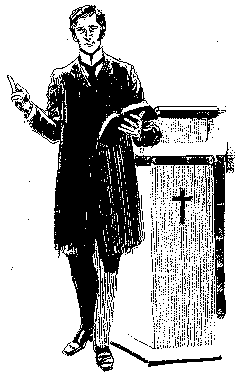Luke 11:2, “And he said unto them, When ye pray, say, Our Father which art in heaven, Hallowed be thy name. Thy kingdom come. Thy will be done, as in heaven, so in earth.”
 Often when we approach the text of any modern version it is with great caution
and bewilderment. For it seems that on every page we are met with blunders of
the foulest kind. Scarcely could a more distasteful error be found than one
attributed to our Lord Jesus Christ.
Often when we approach the text of any modern version it is with great caution
and bewilderment. For it seems that on every page we are met with blunders of
the foulest kind. Scarcely could a more distasteful error be found than one
attributed to our Lord Jesus Christ.
In this brief article I wish to discuss Mark 2:26 where our Lord is recorded
as saying, "How he went into the house of God in the days of Abiathar the high
priest," Here Jesus is describing what happened when David was hungry while on
the run from King Saul.
Our Lord’s recollection of these events is woefully misrepresented by many of
the modern versions. Below is the rendering of 4 popular translations:
NRSV - He entered the house of God, when Abiathar was high priest.
ASV - How he entered into the house of God, when Abiathar was high priest.
TEV - So he went into the house of God and ate the bread offered to God. This happened when Abiathar was the High Priest.
The Message - How he entered the sanctuary and ate fresh bread off the altar, with the Chief Priest Abiathar right there watching.
The importance of this "very serious innovation", as one writer put it, might
possibly escape the notice of general readers. It may be briefly stated that
our Authorized Version (AV) has properly rendered the passage "in the days of
Abiathar the high priest". Abiathar was not high priest when these events took
place but rather his father, Ahimelech, was. Concerning this passage in our AV
Jamieson, Fausset and Brown comment, "But this means not during his high
priesthood — for it was under that of his father Ahimelech — but simply, in
his time."
No doubt Abiathar is recognized here because of his prominence as high priest
during the reign of David but to state that he was high priest when David
entered the temple is not accurate. Yet despite this fact many of the modern
versions have Jesus confusing the whole story and stating that "Abiathar was
high priest". Again, one writer remarks, "A grosser anachronism could scarcely
be committed, and here it is distinctly imputed to our Lord Himself, on the
authority of St. Mark, the Petrine Evangelist."
This extraordinary falsification of well-known history is effected by the
simple omission of the definite article tou. The Greek text that underlies our
AV reads, epi abiaqar tou arcierewV. The Westcott-Hort/Nestle-Aland/UBS Greek
texts all conspire in omitting the definite article before ‘high priest’. The
basis for this omission is, as usual, the Sinaitic ms. (Aleph) and the Vatican
ms. (B). Because of these blind guides these Greek texts and many of the mvs.
based upon them attribute a plain and clear error to our Lord Jesus Christ.
Are we to believe that Jesus didn’t know His Old Testament history? God
forbid!
Some of the mvs. have identified this blunder in their underlying text and
abandon this false witness. However, there are many that retain it in their
translation. "That this is a plain and clear error, is a fact absolutely
indisputable; and is attributed… to our Lord or to the Evangelist (Cook,
Revised Version, p. 70)." Selah!

